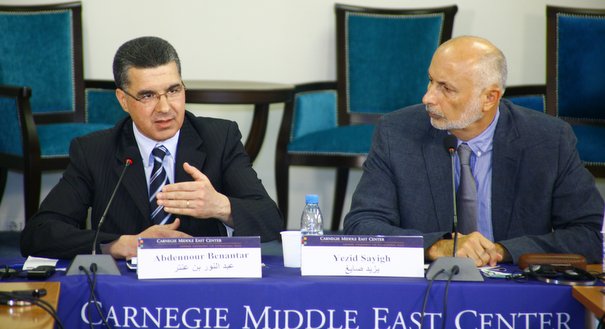Registration
You will receive an email confirming your registration.
Algeria faces complex political and security challenges. The victory of the long-ruling National Liberation Front in May’s general elections has been met with public apathy and alienation, and is viewed as illegitimate by both Islamist and socialist opposition movements. President Abdel-Aziz Bouteflika’s health is ailing and his term ends in 2014, raising questions about the legitimacy and stability of the political system. Algeria also faces threats from al-Qaeda affiliates, regional tensions, and problematic relations with its neighbors in the wake of the Arab Spring.
To discuss these challenges and possible solutions, the Carnegie Middle East Center hosted a discussion with Algerian political scholar Abdennour Benantar. Carnegie’s Yezid Sayigh moderated the event.
Political Paralysis
- Incomplete Transition: The Algerian transition from an authoritarian to democratic government initiated in 1989 is still underway, Benantar said. Unlike in countries in Latin America, Eastern Europe and Iberia, the National Liberation Front wasn’t seriously challenged by a new opposition party during the Civil War and has maintained its grasp on political power.
- Power of the Military: The military has remained an important political player within the country. Though it has claimed to be stepping back its influence on the regime, Benantar emphasized that its efforts at doing so remain questionable. For example, he explained that in elections every candidate still must pay lip service to the army in order to even run.
- Absent Opposition: The National Liberation Front (NLF) continues to benefit from the absence of any true political opposition in Algeria, Benantar argued. By strategically manipulating discord among small opposition parties and cooperating only with radical Salafist groups with no political aspirations, the NLF has successfully minimized the influence of any opposing groups without officially disbanding them.
Avoiding the Arab Spring
Many scholars and news outlets have expressed surprise that Algeria has avoided the Arab Spring, particularly given its proximity to Libya, Tunisia, and Morocco. Benantar explained that for a handful of reasons–both historical and contemporary–Algeria’s apparent immunity to these movements should not be surprising.
- Black Decade Memories: Most citizens still remember the violence and disarray of the 1990s, explained Benantar, leaving them reluctant to initiate or take part in Arab Spring-style protests. This inaction does not reflect support for the regime, he emphasized, but rather a general fear of the unrest and violence that could result from political upheaval.
- Politicians as Puppet-Masters: The regime is very adept at handling civil unrest and ensuring that news of demonstrations in one part of the country does not reach other areas, Benantar added. Given the lack of social cohesion across Algeria’s expansive territory, it is unsurprising that demonstrations have not created the domino effect witnessed elsewhere.
- Oil Money: Rather than invest in much needed social reform, Benantar explained that the regime uses its expansive funds from oil exports to buy votes and popularity. During elections the regime uses its wealth to garner votes by granting major loans to farmers and then promising that they won’t need to be repaid if the regime is re-elected.
- Appearances of Legitimacy: Initially the regime attained legitimacy through revolution. It maintains that legitimacy by combatting terrorism rather than through democratic or constitutional means, Benantar contended.
Security Challenges
Algeria faces a number of security challenges both on its immediate borders and from its Mediterranean and Saharan neighbours.
- Morocco: In the longstanding conflict between Algeria and Morocco over Western Sahara, each country’s government continues to blame the other and borders between the two countries remain closed. Benantar argued that despite this conflict’s longevity, it does not present an overwhelming threat; both coutnries have experienced domestic discord that could have been alleviated by attacking the other, but neither succumbed to such action.
- Libya: Although Algeria underscored its policy of non-interference and opposed NATO’s intervention in Libya, Benantar contended that Algeria has probably benefitted most from the fall of the Qaddafi regime, as it has eliminated tension along its eastern border.
- Europe: Illegal migration from Maghreb countries to Europe greatly troubles European leaders, leading many countries to criminalize migration and fight the problem at its source in North Africa. Following the EU’s lead, Algeria has criminalized foreigners, primarily Chinese and African, who enter Algeria illegally and proclaimed that any Algerian caught attempting to emigrate illegally can be imprisoned.
- Sub-Saharan Africa: Algeria is home to a large number of migrants from other African countries, especially Mali and Sudan. Like many other Maghreb countries, Algeria has mostly turned away from its southern African neighbours and identified itself as an ‘Arab’ rather than an ‘African’ country, a policy Benantar argued is detrimental to Algeria’s regional relations and their shared interest in combating Al-Qaeda and similar terrorist groups operating in the Sahel region.
